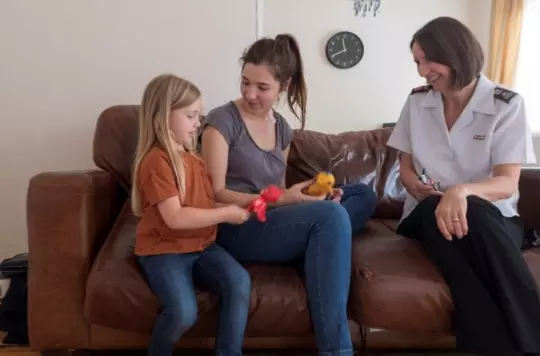Change laws to make housing rough sleepers a priority
published on 31 Jul 2023
New CHAIN Statistics: Change laws to make housing rough sleepers a priority
The number of people living on the streets of London has shot up further, despite the Government’s promise to end rough sleeping, prompting The Salvation Army to call for housing legislation* to be changed.
Under current housing laws, councils have a duty to find accommodation for people who are homeless but only if they are classed as in priority need. Those who don’t qualify can be left to sleep on the streets, sometimes for years.
The latest figures from the UK’s most thorough recording of rough sleepers, released today by the Combined Homelessness & Information Network (CHAIN)**, found that 3272 individuals were found to be sleeping rough in the capital in April-June 2023. This is a 9 per cent increase compared to the same period in 2022.
Director of The Salvation Army's Homelessness Services Unit, Nick Redmore said: “If you don’t have a roof over your head then it stands to reason that you are in desperate need of housing. So, it’s unbelievable that people living on the streets without proper shelter or sanitation and at high risk of illness and injury are not deemed a priority by legislation and being denied council accommodation.
“We understand that public services are under huge financial pressure at the moment, but it’s not acceptable to leave destitute people on the streets and in harm’s way. It’s for the Government to ensure local authorities have the funding and guidance they need to meet their obligations, if it’s to make good on its manifesto promise to end rough sleeping.
“Urgent action can be taken in the short-term by adding those forced to sleep rough to the priority needs list for housing. Meanwhile the Government must work on providing more homes so this system that decides who deserves a roof over their head is abolished.
“The quick and decisive measures taken by the Government to enable rough sleepers to be housed during lockdown, shows what can be achieved when the will is there. Unless the Government recognises that the rise in rough sleeping is also an emergency that requires action now, the cost not only to people’s lives, but also to the public purse will become even greater.”
The latest CHAIN figures also found that 69 per cent of people recorded as sleeping rough in London between April and June 2023 reported problems with mental health, drugs or alcohol. The Salvation Army is calling for mental health and addiction support to become part of local authority homelessness strategies to help end the cycle of rough sleeping.
*The following have a priority need for accommodation set out in the law that applies to all local authorities in England:
(a) a pregnant woman or a person with whom she resides or might reasonably be expected to reside;
(b) a person with whom dependent children reside or might reasonably be expected to reside;
(c) a person who is vulnerable as a result of old age, mental illness or handicap or physical disability or other special reason, or with whom such a person resides or might reasonably be expected to reside;
(d) a person who is homeless or threatened with homelessness as a result of an emergency such as flood, fire or other disaster.
(e) a person who is homeless as a result of that person being a victim of domestic abuse.
(f) a person who is 16 or 17 years old and not being looked after by social services.
(g) a person who is 18, 19 or 20 years old and spent time in care while between 16 and 18.
** 3272 individuals were found to be sleeping rough in the capital in April-June 2023. This is a 9% increase on the total figure for April-June 2022.
Of that total:
- new rough sleepers account for 49% of all rough sleepers
- intermittent rough sleepers account for 39% of all those recorded in the period, and
- 13% of those recorded during the period were living on the streets.
- 1614 people were sleeping rough for the first time. Of these:
- 1269 (79%) spent just one night sleeping rough
- 307 (19%) slept rough for more than one night but did not go on to live on the streets
- 38 (2%) were deemed to be living on the streets.
